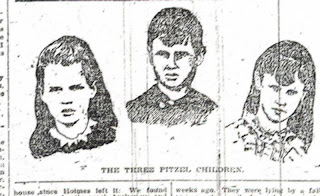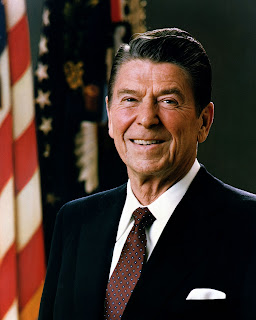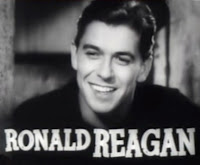
As we all celebrate Martin Luther King Jr. Day, hopefully all of us will remember King and all he did for the Civil Rights Movement, and not just enjoy their day off from work/school. Martin Luther King Jr. Day is celebrating it's 27th anniversary, becoming a national holiday in 1986. King stands today as a national icon, a beacon of hope for racial equality, and one of the greatest orators in American history. Here is a little bit about his life.
Born January 15th, 1929, in Atlanta, Georgia, King was born Michael King, as was his father. This all changed when the family visited Germany among other European countries in 1934 and the family decided to change both of the names to Martin Luther to honor the German Protestant leader. His father was a preacher, so King was subject to religion from the onset, but didn't believe in many parts of Christianity until later in college. King first attended college and earned a Bachelor's in Sociology before enrolling in seminary school and earning a Bachelor's in Divinity in 1951. Then in 1955, he received his Doctorate in Philosophy from Boston College with the dissertation: "A Comparison of the Conceptions of God in the Thinking of Paul Tillich and Henry Nelson Wieman.
King became interested in the Civil Rights Movement, and drew on many men for inspiration, notably Howard Thurman, a Civil Rights leader and theologian, and Gandhi, whose birthplace King visited in 1959. This visit helped King realize the power of non-violent resistance, and how it could help those fighting for equality in America. Closest influence on King was Bayard Rustin, who further taught King about non-violent resistance, and the ways of Gandhi. Rustin mentored King in his early years, though since Rustin was openly homosexual, supported democratic socialism, and had former ties with the American Communist Party, many African American leaders wanted King to distance himself from Rustin.
King stepped into the scene of Civil Rights with his help in orchestrating the Montgomery Bus Boycott. In 1955, Claudette Colvin, a 15 year old student, refused to give up her seat to a white man in compliance with Jim Crow laws, which caused her to be arrested. King was serving on a Birmingham African-American Committee at the time and looked into the case. The case was a hard one to take up, they felt, because Colvin was pregnant and unmarried. King and the committee decided to wait for s

omething else to happen. Nine months later, Rosa Parks refused to move for a white man, and was also arrested. E.D. Nixon, a Civil Rights leader and part of the Birmingham committee decided that Parks was the person to take up in their cause and began planning a bus boycott. There was much discussion on who would lead the boycott, with some wanting Reverend Ralph Abernathy to lead, and some wanting King. King ultimately was chosen, due to not being from around the area. Many were afraid that Abernathy would have past things brought up against him to discredit the movement, and decided that a person with no known history in the area was better. The Montgomery Bus Boycott started and hit the Montgomery
Bus company hard. Most of it's riders were African American's going to and from work. At first the boycott members only asked that they not be told to move out of their seats. They were not asking that buses be desegregated, but as the boycott dragged on and the city wouldn't allow any sort of compromise, the boycott members eventually decided to fight for desegregation. To get to work, many carpooled or got discounted rides from taxi drivers. The city tried to foil this by fining any taxi driver who charged less than 45 cents. This went largely unenforced. Things grew extremely tense as the
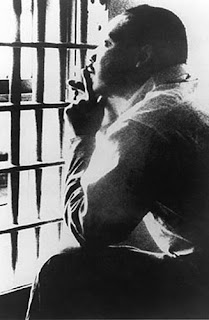
city and the boycott members were basically in an all out war. The city tried to make the boycott members look bad by saying they were violent towards those African-Americans who still rode the buses. This wasn't exactly true, as violence towards riders was few and far between and were not endorsed by the NAACP, who was an integral part of the boycott, or the Birmingham committee. Things got so heated that King's and Abernathy's houses were both firebombed, as well as several Baptist churches in the area. King and others were eventually arrested for "hindering" a bus and ordered to pay $500 dollars or serve 386 days in jail. King ended up serving just two weeks in jail and was released. This was a major mistake by the city, as it brought the issue to national attention. The bus boycott lasted 381 days, and ended after a federal district court found that the segregation laws were in fact unconstitutional. This was appealed, but later held up by the Supreme Court. The Civil Rights Movement had it's first official victory, and King was catapulted into the spotlight of the Civil Rights Movement.
In 1957, Ralph Abernathy, King, and other Civil Rights leaders formed the Southern Christian Leadership Conference. The group was created to harness the moral authority and organizing power of black churches to conduct non-violent protests in the service of civil rights reform. King led the SCLC until his death. King had his second brush with death when he was stabbed by Izola Curry, a deranged African-American woman, with a letter opener while he was signing books at a department store in 1958. Curry was subdued and deemed unfit for trial and was committed. King was rushed to the hospital and had the letter opener taken out of his chest. Doctors claimed that if King had so much as sneezed in the hours between the assassination attempt and the end of surgery, his aorta would have ruptured and he would of choked on his own blood. King recovered and led the SCLC on many different protests and marches, most notably in Albany, Birmingham, and St. Augustine,

Florida. King again used his method of non-violence to fight for desegregation , right to vote without being harassed, and labor rights. Albany proved to be the harder of the three, as he was arrested, but let out in a few days. Divisions among African-Americans and little to no response from local government prompted King and others to leave with the moral high ground. Birmingham garnered positive results for King, as his fight against segregation in the workplace was successful. King and the SCLC ran low on adult protesters during this time though, and many students and younger adults began protesting. This was known as King's "Children's Crusade." Though the sit-ins and protests were successful, many complained that King was putting the younger men and women in harm's way.
About this time in 1963, the FBI and Attorney General Robert Kennedy became convinced that the SCLC were being overrun by Communists. This led to the wiretapping of King and other SCLC member's phones. Kennedy himself even asked King to distance himself from SCLC members who had previous Communist affiliations. King and others were officially being watched for fear that they were Communists, or harbored Communists. Kennedy had good intentions, as he didn't want word out that there were Communists in the party, as it would hurt the Civil Rights Movement. J. Edgar Hoover on the other hand, the FBI director, had bad intentions. When he couldn't prove that there were any Communists in the SCLC, he went on trying to discredit King, to make him step down as a Civil Rights leader, even going as far as to reveal King's supposed extra-marital affairs.
In August, 1963, along with the other five organizations of the "Big Six" Civil Rights organizations, King and the SCLC put together the famous March on Washington. Made up a quarter of a million people, the march was a resounding success. Originally meant to be a straight up challenge to the American government to make change in Civil Rights legislation, the event had to be toned down because President Kennedy feared that many legislators would find it to be too extremist and it would

ultimately hurt the Civil Rights Movement. The marchers still asked for desegregation in the workplace, a $2 minimum wage, desegregation in public schools, and reasonable Civil Rights legislation. With the crowd surrounding the reflecting pool and going all the way to the Washington Monument from the steps of the Lincoln Memorial, King delivered his famous "I Have a Dream" speech. The speech spoke perfectly what King and the SCLC wanted for all men and women of the United States, and has been regarded as being one of the greatest speeches of all time in America, along with Lincoln's Gettysburg Address, and FDR's Infamy speech. This event truly brought Civil Rights to the forefront of the political agenda for Congress and caused the Civil Rights Act of 1964 to be passed.
King and Abernathy then decided to take the movement to the North, namely the slums of Chicago. They moved into the slums, for educational purposes, as to show their empathy for the poor in the area. The situation grew violent, as Chicago did not receive the Civil Rights movement like the South had. Every time they tried to get a march going, people would basically start a riot, so King made an agreement with the Chicago mayor that he would halt any marches, as he feared for people's safety. King in the last couple years before his death focused his attention on economic injustices against African-Americans and the Vietnam War. King, like many others in the U.S. had become tired of the U.S. involvement in Vietnam and openly stated that he opposed the war for many reasons including that it took money away from social welfare.
On March 29th, 1968, King went to Memphis, Tennessee to support black sanitary works employees who had been on strike for better wages and treatment. In the time in Memphis, he also gave his "I've Been to the Mo

untaintop" speech to a rally at the Mason Temple. On April 4th, while standing on the balcony of his second story motel room, King was shot through the cheek, with the bullet lodging itself into his shoulder. King was rushed to the hospital but was pronounced DOA. When word of King's assassination got out, terrible riots started in Washington, DC, Baltimore, Chicago, and dozens of other cities around the U.S. President Johnson's vice president, Hubert Humphrey attended the funeral in the president's place, as Johnson felt that his presence may cause a riot. Remember, Johnson was not terribly popular at the time. Two months after King's death, escaped convict James Earl Ray was arrested in a London airport as he was trying to fly to Rhodesia with a fake Canadian passport. He was quickly extradited to Tennessee and was charged with King's murder. He plead guilty initially, then three days later claimed that he was innocent and he was part of a large conspiracy. Ray was given a 99 year prison sentence and died there in 1998. Ray tried to get his guilty plea taken off his whole life, unsuccessfully, and claimed several times that he did not shoot King. King's son has even supported Ray, believing that he was not the man who shot his father. Numerous conspiracy theories exist about the assassination. Many think that Hoover and the FBI made Ray a scapegoat and had someone else kill King. Loyd Jowers, a restaurant owner in the area where King was shot came forward and claimed that the Mafia and the U.S. Government had Memphis Police Department Officer, Lt. Earl Clark kill King and used Ray as a patsy. Though it wasn't proven, the King family has sided with Ray and believed that King was murdered by someone else.
King was a expert orator, a inspirational figure and the perfect leader for the Civil Rights Movement. This is not to say that he was perfect however. Findings in 1980 showed that King had plagiarized parts of his dissertation for his doctorate. Boston college, upon finding out the information, decided not to rescind King's Doctorate, as they felt it still "makes an intelligent contribution to scholarship." Many of King's closest friends said that he tended to borrow others words for use in his speeches as to help his point. King, allegedly, also had a weakness for women. Abernathy and other friends testified to this, knowing that King had extramarital affairs, something that the FBI stumbled upon while wiretapping King's phone. The FBI attempted to use this against King, even going so far as to send threatening letters to him about exposing these facts to the public. King was also said to have Communist affiliations, but that is from the paranoid allegations of the FBI. Like the claims of Communist connections, the infidelity has not been proven and is only rumored. If true, this puts King alongside of just about every American president, and many American's throughout history. His plagiarism and possible infidelity just proved that King was in fact just a man, and able to make mistakes like any other person. These do not take away from the countless ways he helped African Americans and the Civil Rights movement with his motivational and moving speeches and sermons. There is a reason that we have a whole day dedicated to him, though it's not quite enough to honor this great American man. By showing love and compassion towards one another, no matter what race, religion, or creed, we can keep King's dream alive.

 In the summer of 1787, Mason, now an elder statesman, was called out of retirement to attend the Constitutional Convention and to assist in writing the new nation's constitution. He took the job very seriously and delivered more than 136 speeches on the convention floor. But as the work progressed, Mason grew to dislike the direction in which he saw the document headed. He announced "that he would sooner chop off his right hand" than see such a constitution passed. He felt that the working constitution was flawed because it didn't contain a Bill of Rights, the Supreme Court was made too powerful, the president had excessive pardoning powers, slaves were allowed to be imported for another 20 years, and the proposed constitution threatened to "produce a monarchy or a corrupt, tyrannical aristocracy."
In the summer of 1787, Mason, now an elder statesman, was called out of retirement to attend the Constitutional Convention and to assist in writing the new nation's constitution. He took the job very seriously and delivered more than 136 speeches on the convention floor. But as the work progressed, Mason grew to dislike the direction in which he saw the document headed. He announced "that he would sooner chop off his right hand" than see such a constitution passed. He felt that the working constitution was flawed because it didn't contain a Bill of Rights, the Supreme Court was made too powerful, the president had excessive pardoning powers, slaves were allowed to be imported for another 20 years, and the proposed constitution threatened to "produce a monarchy or a corrupt, tyrannical aristocracy." George Mason died on October 7, 1792 at his home in Virginia. His refusal to sign the Constitution makes him largely unknown to modern Americans, but his place as the "Father of the Bill of Rights" and one of the most important Founding Fathers is unquestioned.
George Mason died on October 7, 1792 at his home in Virginia. His refusal to sign the Constitution makes him largely unknown to modern Americans, but his place as the "Father of the Bill of Rights" and one of the most important Founding Fathers is unquestioned.









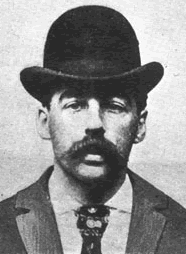 Holmes is known as the first American serial killer, having supposedly killed up to 250 people.
Holmes is known as the first American serial killer, having supposedly killed up to 250 people.

